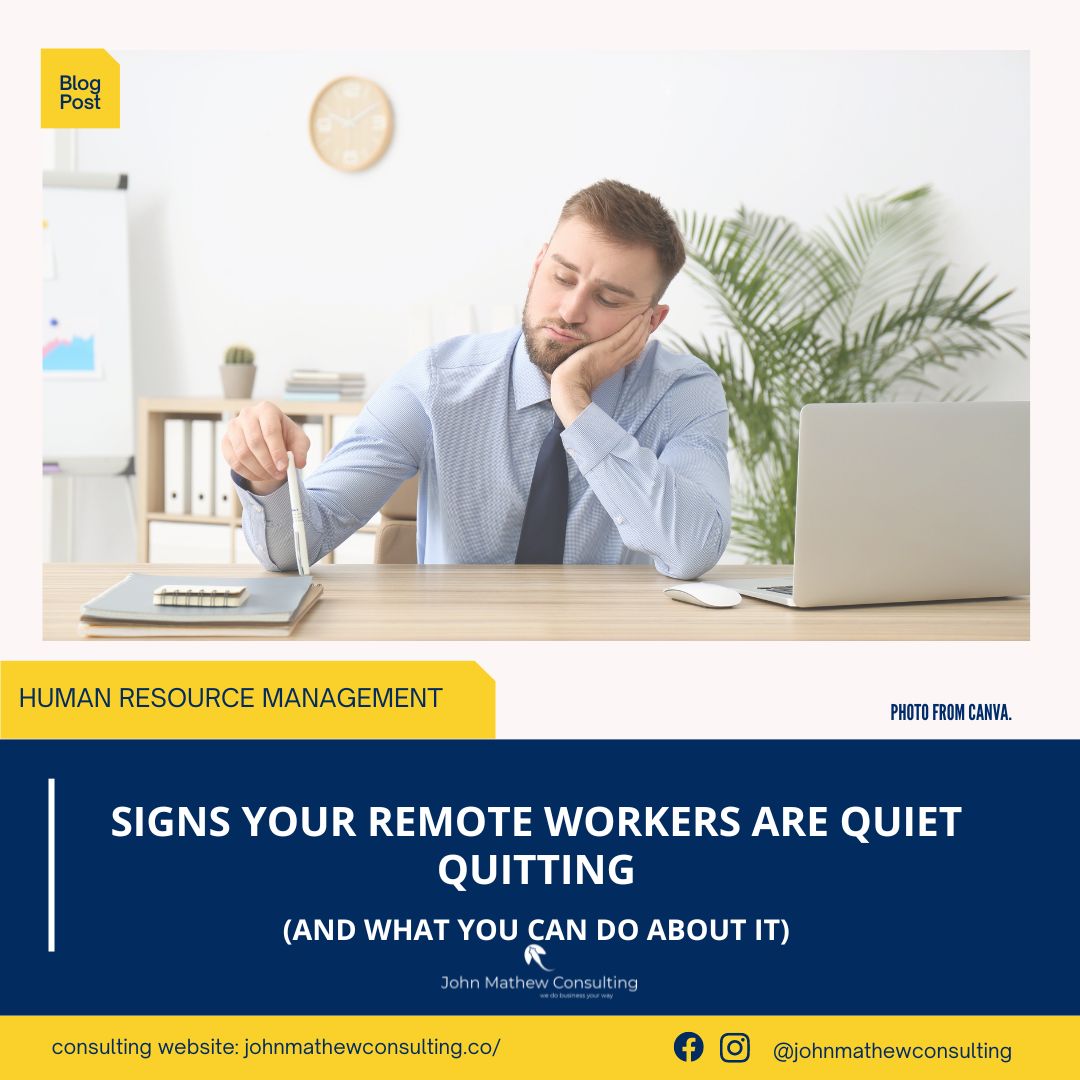Signs Your Remote Workers are Quiet Quitting (and What You Can Do About It)

Quiet quitting has become prevalent among young workers today, mainly because of employee burnout. A 2022 study by WHO found that 50% of employees aged 26 to 55 feel stressed, worried, and anxious due to the COVID-19 pandemic, remote work, financial and work performance pressures, and other personal issues.
As a result, they lose focus and confidence and feel dissatisfied with things they usually enjoy. Companies also see increased absenteeism, productivity loss, and resignations because of employee burnout. These effects may be worse for employers with remote workers since they’re limited to online interactions. Here’s an in-depth guide about quiet quitting and what you can do to mitigate it.
What is Quiet Quitting?
Quiet quitting doesn’t exactly mean resigning or leaving the company; rather, it is a mindset that employees adopt where they do the bare minimum at their job. They no longer interact with their colleagues beyond what is necessary, accept tasks outside their responsibilities, work overtime, and obsess with climbing the corporate ladder. Quiet quitters also don’t base their worth on their labor.
Career coach Bryan Creely coined the official term “quiet quitting” in March 2022, though many think it’s nothing more than a repackaged version of the mantra “act your wage.”
Quiet quitting is also deemed an extension of the Great Resignation of 2021, where millions of employees worldwide left their jobs to seek better pay, career opportunities, and workplaces. This economic movement changed the job market and alarmed companies struggling to keep their existing workforce.
Employers understand that burnout and fatigue from remote work can cause employees to quit quietly. However, many believe quiet quitting is unsustainable because it can affect productivity and lead to work tensions. Lensa CEO Gergo Vari even suggested replacing “quiet quitting” with “loudly persisting,” as the latter implies a win-win situation for employees and employers.
5 Signs Your Remote Workers are Quiet Quitting (and What You Can Do About It)
Spotting quiet quitters can be difficult, especially if you lead a remote team. Here are ways to identify them in your organization, with tips on how to boost their morale and productivity.
1. Lack of enthusiasm
Employees become unenthusiastic at work when they feel disconnected from their jobs, lack self-efficacy, have disruptive emotions, or struggle to understand their poor performance.
Remote work settings exacerbate these situations since employees have limited interaction with their colleagues and managers. Toxic work cultures also affect employee morale, leading them to disengage or seek greener pastures elsewhere.
Our advice: Create a healthy work environment where employees feel genuinely interested and confident in their work. Give and seek helpful feedback, improve company culture, initiate engaging virtual activities, and retrain toxic employees. Doing these things will make your employees feel valued and respected in your organization.
2. Underperformance
Handling remote employees means measuring their performance based on output. So, when they start producing half-baked submissions or missing deadlines, take it as a sign they’re slowly and quietly quitting.
The reasons behind poor performance can vary. They may feel indifferent about their job, lack resources, or see no reward for going above and beyond. Others may also have personal issues that prevent them from fulfilling their responsibilities and performing well at work.
Our advice is ensure your remote team is properly trained and equipped to do their job. Give them various tasks to practice their knowledge and skills and prepare them for different challenges.
In some cases, employees perform poorly because they feel they’re not being paid fairly. Do a compensation analysis to review your salary scheme and pay employees based on industry standards and their skills and knowledge.
You can also set up an Employee Assistance Program (EAP) to help them through difficult times. They’ll be more capable of working efficiently once their personal problems are better managed
3. Non-participation in meetings
Burnout or personal problems hinder employees from actively participating in meetings. They are inattentive, make little to no contributions, show up late, or don’t attend meetings at all.
Meetings are harder to schedule in a remote setting because you must match everyone’s free time and ensure the discussion is rich and valuable. As such, non-participation in meetings could be detrimental to your employees’ performance and stifle innovations in your company.
Our advice: Make attending meetings easier by scheduling automated reminders and providing an agenda so they can prepare and make meetings more productive. You can also make them more engaging to encourage your remote employees to join. Forcing them to attend boring meetings can make them feel disengaged and annoyed at work.
4. Noticeable withdrawal from non-work-related activities
Virtual games and hangouts have become common among remote teams since the pandemic began. However, some employees would rather skip them and disengage from their colleagues, which could affect teamwork in the long run.
What you can do: Make non-work-related activities fun and enticing to ensure your remote employees attend voluntarily. Ask them what activities they’d enjoy so they wouldn’t feel forced to join games they don’t even like or understand.
Ensure that business executives and managers also join in on the fun, so their subordinates see them as regular people instead of scary authority figures at work.
5. Not taking on bigger responsibilities
Quiet quitters refuse to accept additional work, especially outside their job description, because they want to save time and energy to do the things they deem more important. They turn down more responsibilities once they know they won’t get paid for them.
What they don’t realize is that some job scopes widen over time to match their skills and experiences and keep up with evolving business and industry trends.
What you can do: Be upfront about job growth and expectations as early as the interview stage. Ensure that candidates know what role they’re applying for and the standard and additional duties they may have to handle.
Setting their career growth expectations at the onset prevents them from feeling burned out in the future as they have a clear career development track to keep in sight of.
Conclusion
It may be difficult to conclude that some of your employees are quietly quitting since they’re remote. Some warning signs of quiet quitting could also point to non-work-related issues. Nonetheless, you should check in on your remote employees from time to time to ensure they still feel engaged and comfortable at work.
Giving your remote employees the proper resources and opportunities to work and voice their concerns can benefit your business in the long run.
If you need help with the recruitment or training, we at John Mathew Consulting provide nothing short of the best services. Whether you are a candidate looking for a job, or a client looking for great staff, it takes a lot of time, effort and persistence. Here at Patrice and Associates we assure you, you are in the best hands. We are the largest and most successful recruiting firm in the hospitality industry, with a 30 year track-record, enormous database of candidates & jobs, unmatched industry intelligence and many proprietary tools that will help you stand out from the competition. First consultations are always free!
Back







